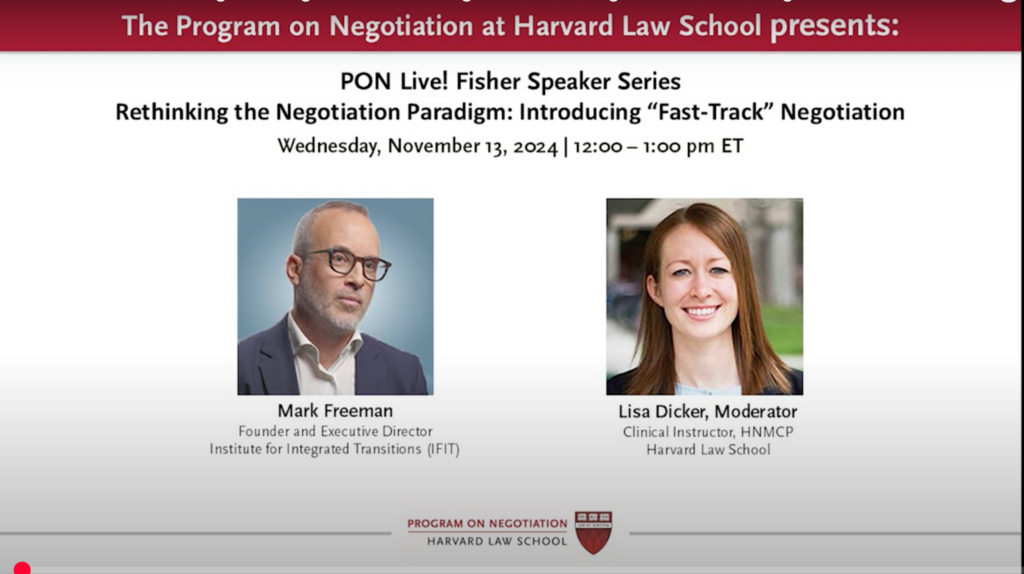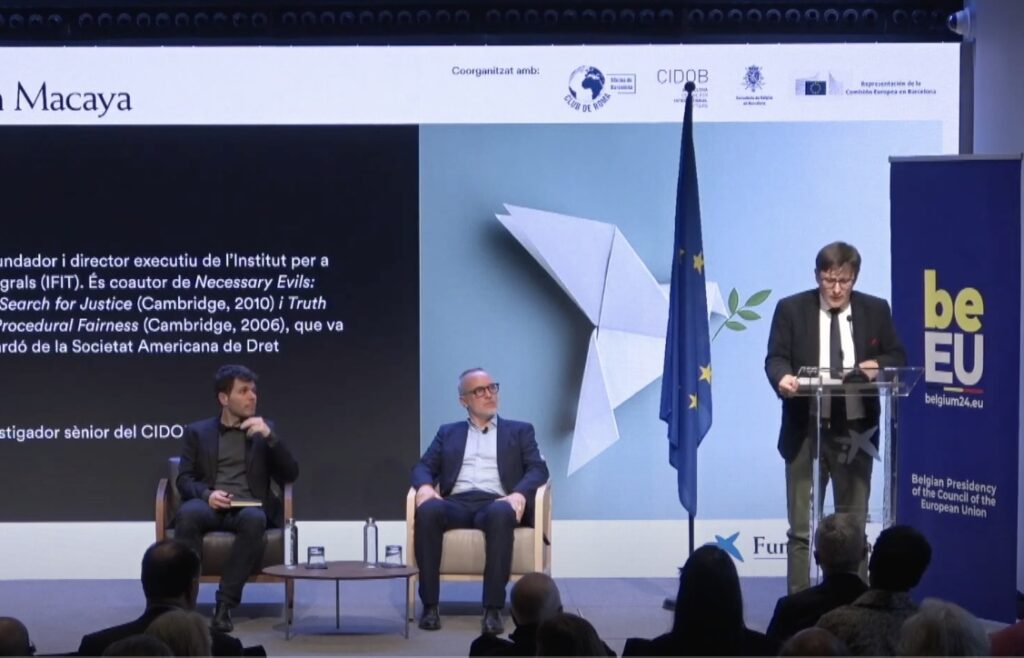
IFIT / Innovations in peace negotiation and conflict resolution
The Initiative on Fast-Track Negotiation
Negotiation is among the best known and most used tools for advancing peace and political transition. Yet, the dominant model of the last few decades is built on methodological premises which, in aggregate, produce very slow negotiation. A “fast-track” negotiation model is needed to match the more urgent pace of the majority of crisis and conflict situations. Slow negotiation no longer works.
Scroll down for more
Achieving peace through the fast-track negotiation model
The problem
Millennial in origin, peace negotiation is the lifeblood of conflict resolution. There would be far less peace in the world without it. Yet, as explained in “Fast-Track Negotiation”: A White Paper (M. Freeman, January 2025), negotiation in the 21st century is stumbling badly on account of two interrelated but fixable problems: 1) practice is dominated by a single model of what is considered effective and legitimate negotiation; and 2) the dominant model’s underlying tenets, in aggregate, produce a form of negotiation that is very slow.
Introducing the fast-track negotiation model
Fast-track negotiation is a model of conflict resolution broadly oriented toward the goal of “negative peace” (i.e., the absence of direct violence). That is because the predominant choice in most conflict and crisis situations is not between the heavenly ideal of “positive peace” and the practical need for “negative peace”. It is between negative peace and no peace.
Reaching settlements and reducing violence faster
The discomforting truth is that today’s dominant but slow paradigm of negotiation rarely produces a settlement, thus eviscerating the very case for its core principles, practices and assumptions – namely, that legitimacy of process produces sustainability of implementation. It is time to return to first principles by recreating a paradigm that prioritises the reaching of settlements. It is time to acknowledge that sustainability is a vacant ideal in the absence of negotiated outcomes.
Three Features of the Fast-track Model



Benefits of the fast-track model
Deter conflict
In today’s more urgent and fragmented conflict landscape, the slow model of negotiation that has dominated theory and practice isn’t producing settlements. Instead it is producing negative opportunity costs.
In a 21st century conflict landscape in which urgency is the rule and non-urgency the exception, we need a new negotiation paradigm. “Fast-track negotiation” offers just that.
“Get to yes” faster
Increasing negotiation speed and pragmatism can lead to more agreements, thus helping restore negotiation’s crucial role in preventing and resolving large-scale violence.
Condensed talks “get to yes” faster.
Localised and more nimble
The dominant paradigm’s features make it an increasingly obsolete mismatch with the urgent local needs and speed of deterioration typical of most situations in today’s far more fragmented conflict landscape.
A new and different paradigm – “fast-track negotiation” – offers enlarged options for reaching agreements and relies on principles, practices and assumptions that promise greater speed, localisation and realism.
Impact on peace negotiations
Since the launch of the Initiative on Fast‑Track Negotiation, IFIT has actively advanced uptake and testing of the mode and scores of high‑level presentations to international organisations, national governments, and key stakeholder groups have been done. These have served both to introduce the fast‑track framework and to solicit strategic feedback for refinement.
Additionally, IFIT has organised bespoke training programmes tailored to specific country contexts—spanning both post‑conflict and fragile state settings. These workshops have equipped local practitioners with practical tools to adapt and operationalise the model on the ground.
FAQ
Johan Galtung, a pioneer in peace studies, defined “negative peace” as the absence of direct violence. This contrasts with “positive peace”, which involves addressing the structural roots of conflict to create a just and equitable society.
In IFIT’s “Fast-Track Negotiation: A White Paper”, we argue that in the context of an eroded liberal international order, the predominant choice is not between the heavenly ideal of “positive peace” and the practical need for “negative peace”. It is between negative peace and no peace – a choice with an obvious answer when you are suffering the brunt of violence and disorder.
Peace negotiations typically include a pre-negotiation stage to explore party willingness and agree on the design of the process; a formal talks stage to negotiate the issues on the agreed agenda; and finally an implementation stage in the event that an agreement is reached.
A mediator is a neutral third party who facilitates dialogue, helps manage the negotiation process and assists the parties concerned in reaching a mutually acceptable agreement, playing a crucial role in diplomacy and conflict resolution.







